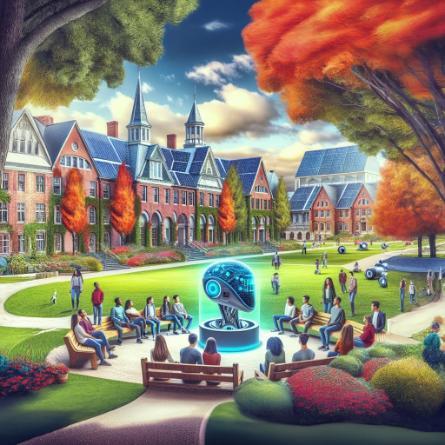College launches AI@Conn, a three-year initiative to integrate AI into academic programs
Artificial intelligence (AI) is rapidly changing the way people work, learn and conduct research. To prepare students for the challenges and opportunities of an increasingly AI-driven world, Connecticut College has launched a three-year initiative, “AI@Conn: Empowering Liberal Arts Education with AI,” to integrate AI tools and topics into academic programs and enhance teaching, research and engagement with technology across campus. AI@Conn is funded by a substantial bequest to the Diane Y. Williams ’59 Instructional Technology Fund from Ad Astra and Rosemary Park Society member Harold F. Wiley, who died in 2023.
“AI@Conn adds a new dimension to our signature academic program, Connections, and prepares students for successful careers in a modern world,” said Dean of the College and Interim Dean of Equity and Inclusion Erika J. Smith. “This multidimensional initiative will position Conn as a leader in innovative technology education across disciplines.”
Wiley’s gift, designated for academic technology, inspired Vice President for Information Services and Librarian of the College Matt Gardzina to develop an AI focus shaped by input from faculty, the Generative AI for Teaching & Learning Community, and discussions with Library & Information Technology staff. "We led with the idea that AI won’t replace your job, but the person who knows how to use it might,” he said.
A cornerstone of the initiative is the creation of a two-year fellowship. The Harold F. Wiley Fellow in Artificial Intelligence will bring specialized knowledge to the College to support faculty in AI-related projects, assist in course development and lead summer workshops.
“The idea is that this dedicated position will help oversee academic AI interests and support various departments. This will allow Computer Science faculty and other campus experts to focus on the research and creation of AI, whereas the AI fellow will help with faculty development and address issues like ethical concerns and safety,” Gardzina explained.
Through professional development workshops, course development support and new technologies, faculty members who believe their courses would benefit from AI—or are interested in exploring whether they would—will be given the tools and knowledge needed to incorporate it into their teaching and research practices.
Stipends will be available for faculty members who wish to modify assignments within existing courses, create new assignments, update existing courses to include significant AI components or create new AI-focused courses. AI@Conn will also provide stipends and resources to support student-faculty summer research projects focused on AI.
Jean C. Tempel ’65 Professor of Chemistry Marc Zimmer, who joined the faculty in 1990, said students will benefit greatly from guidance on how to incorporate AI into their current studies and future careers. “AI is here to stay,” he said. “It might be intimidating, but our students have to learn when and how to use it efficiently and ethically.”
An early adopter, Zimmer uses AI as a tool to enhance his teaching and help students absorb the material in a way that best works for their learning style. By uploading his textbook, notes and previous tests into ChatGPT 4.0 and inputting his own written instructions for the length and level of answers to provide, he created a private interactive tool for his students called Marc’s Chemistry Tutor.
Last fall, students in Virginia Eason Weinmann ’51 Professor of History Leo Garofalo’s “Latin American Immigration and Migration” seminar used AI to facilitate data analysis. “They used it very effectively and ethically to help with recording and transcribing the interviews that they conducted for their oral history projects. I was amazed at what they could do, and how much time it saved them so that they could focus on the higher-level analysis and organization to create a compelling narrative,” Garofalo said.
AI, which refers broadly to the process of a computer mimicking human behavior in response to specific instructions input by a user, can be used to organize and identify patterns within huge amounts of data and produce results that far surpass human capability. At the same time, the technology and its uses raise serious questions about accuracy, authenticity, bias, copyright, honesty and privacy. It also blurs the line between academia and the corporate world as companies like Google, Microsoft and OpenAI become a larger presence in the classroom, and some have questioned the environmental impact of running the computer systems required for AI.
Gardzina said the AI@Conn initiative is designed to empower faculty, staff and students to explore and address these questions. “The idea is to get many faculty members across many disciplines thinking about the use of this technology in a more advanced way.”
Zimmer said the solution to the environmental impact issue, ironically, might be found in AI itself. “Climate change is something AI could eventually solve. For example, we can use [genome-editing technology] CRISPR to generate bacteria that will consume carbon dioxide. AI could be the answer to its own [environmental] problem.”
The College plans to share its resources and expertise with other small liberal arts institutions through workshops, conferences, digital media and symposia at Conn in the fall of 2025 and 2026.
Director of Gift Planning Laura Becker, who worked directly with Williams and Wiley and helped facilitate the bequest that supports AI@Conn, said, “We are deeply grateful for Mr. Wiley’s gifts and Miss Williams’ ongoing support, which enables Connecticut College to continue its tradition of innovation in liberal arts education. Through his friendship with Miss Williams, Mr. Wiley was a generous supporter of Connecticut College for a long time and established several charitable gift annuities with the school.” Becker called this latest donation “a testament to the power and impact planned gifts can have on the College.”
